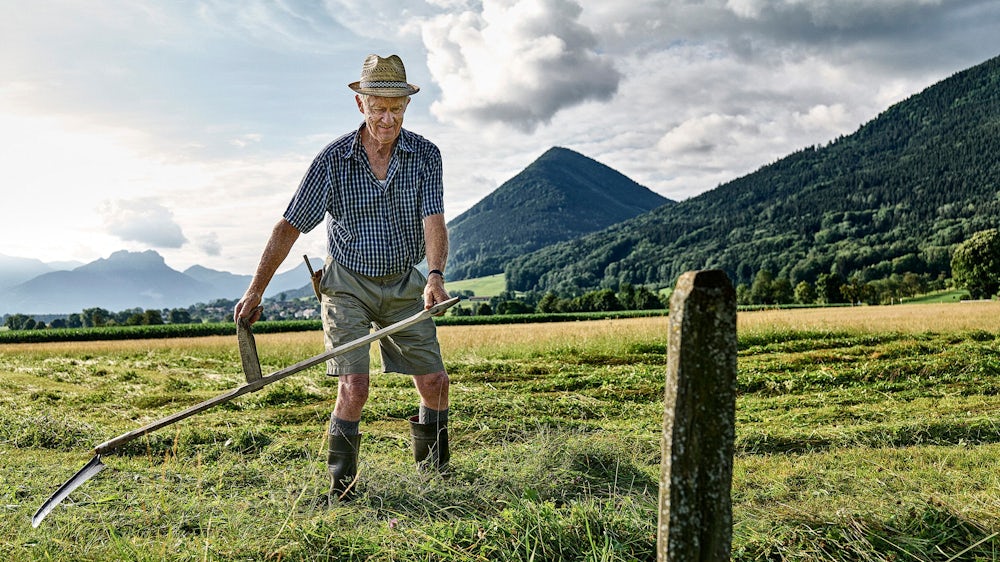Things may be different in the high Alps, where nothing beats an impressive summit region – the almost perfect pyramid of the Matterhorn, the never-ending north face of the Eiger, the ensemble of the Watzmann peaks: Such uplifting shapes make these mountains special in the eyes of many people.
But beneath the bare rock, snow and ice, the impressive gives way to the idyllic. This is largely due to the fact that every decent mountain has its own alpine pasture (ideally several), and there are cows on these pastures. If the grass on such an alpine pasture is cut with a scythe and mountain cheese is made by hand, then happiness is perfect. At least for the viewer of this scenery.
Alpine pastures are places of longing. They serve the desire for homeliness, for intact conditions, for originality. Also for manageability, simplicity, leisureliness. However, they are places of longing that are under threat. Their numbers are decreasing, which has an impact on the alpine cultural landscape and its sustainable management and therefore not least on the quality of food production. The photographer Klaus Maria Einwanger, who lives in Rosenheim, has visited eight mountain farming families over a long period of time, on their farms and alpine pastures in the Mangfall Mountains and the Alpine foothills to the north: the Brandstatter and Hölzlhof are in Waakirchen, the Seebacher and Scharlhof in Bad Feilnbach, the other farms are in Gmund am Tegernsee, in Schliersee, in Kreuth and Fischbachau.
According to an EU directive, a farmer can call himself a mountain farmer if his pastures are higher than 700 meters above sea level or have a fixed slope above 500 meters above sea level. Where mountain farmers are active in the Alps, the mountains are not primarily natural but rather cultural landscapes. If the alpine pastures were not grazed, they would quickly become overgrown with bushes and the diversity of grasses, flowers and herbs would noticeably decrease. High-quality milk and cheese would no longer be produced.
But working on the mountain is arduous, no longer sufficiently profitable for many farmers and, what’s more, extremely bureaucratic. This is why more and more mountain farmers are giving up, often when their descendants do not want to take over the farm. Of the eight families that Klaus Maria Einwanger has portrayed, some only farm as a secondary occupation. But they do so with great commitment and passion – and in all families it looks as if the farms that have been in their possession for centuries will have a future because the next generation is ready to take over the inheritance.

“Mountain Farmers” is the second illustrated book that Klaus Maria Einwanger has published. The first, “Taxi Drivers. Written In Their Faces”, is also dedicated to a specific professional group, portraying taxi drivers in New York, London and Tokyo. Einwanger has also built up relationships with the protagonists of his pictures, getting to know them before he photographed them. It is similar with the mountain farmers. They do not pose for the camera, but go about their daily work, and do not stage anything for the camera.
Pictures like those Einwanger took for the book are rarely created on a first or second encounter. The photographer is there when the animals are brought from the low to the high alpine pastures. When the calves are allowed out of the stables to graze for the first time and sometimes explore the area with great abandon. He doesn’t just show the idyllic scenery, but also the wood cutting, the haymaking, the hooves trimming, the mucking out, the repairing of the huts and the work in the small sawmill.

And Klaus Maria Einwanger also speaks to farmers and quotes them in his book. It is not clear whether they took part in the recent protests and blocked motorway entrances with their tractors or drove to Munich’s Theresienwiese to express their anger. The tone of their descriptions is certainly not angry or upset. But they have clear opinions about the value of their work, the price (not just financial) that healthy food must have, and the often perceived lack of recognition of their work and way of life.
What is aesthetically special about Klaus Maria Einwanger’s photographs is their remarkably high-contrast coloration. And this despite the fact that they are printed on matte paper and the color range of the motifs is almost exclusively brown, green and gray. Mountain farmers are not people who wear bright red or garish yellow functional clothing or own pink tractors and milking machines.

The living rooms are wood-paneled, the Fleckvieh cattle are the classic Upper Bavarian brown and white, and the hats are made of grey felt. Einwanger took photos in rain and fog, under cloudy skies, in the shade of the forest and in the darkness of haystacks, without artificial light. Regardless of the external conditions, the lighting in the photos is impressive. Einwanger brings out the many shades of green on a mountain slope with pasture and forest, and the different shades of brown and beige in the stable in a nuanced way.
This creates very clear, detailed images in which there is rarely anything spectacular – but which nevertheless catch your eye. First of all, because they are portraits of places of longing that trigger you accordingly. The longer you look at the individual photographs, the more you realize that you are not looking at a backdrop, an ideal image. But at the reality behind it. The book “Mountain Farmers” doesn’t sugarcoat anything. Nevertheless, you understand why the farmers gathered in it want to be nothing other than what they are of their own free will.
Klaus Maria Einwanger: Mountain farmers. KME Studios, Rosenheim 2024. 288 pages, 48 euros.

